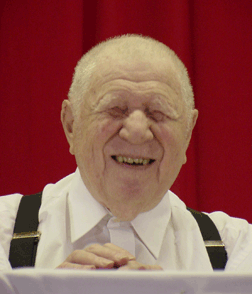
LOGO

LOGO
What we do
BroadCast Math
Is a partnership between Brooklyn College Radio (Department of Television and Radio) and Brooklyn College Mathematics Department
We produce original short vignettes for radio broadcast based upon scripts written by students in the Brooklyn College general education mathematics course.
We explore topics such as Numbers; Symmetry in art and architecture; Game theory and decision making; Limits of mathematical knowledge. And we highlight contributions of mathematicians whose work has been critical in human development.

Braille Code for Mathematics and Science Notation
Abraham Nemeth is the inventor of Nemeth Code, the Braille encoding for mathematics and scientific notation in North America. Nemeth was born in New York City in 1918 and is blind from birth. Despite his love for mathematics, he was dissuaded at Brooklyn College from a major in that subject; instead he earned the Bachelor’s and Master’s degrees in psychology at Brooklyn College and Columbia University respectively. Nemeth returned to Brooklyn College to study mathematics at night and supported himself with part time mathematics teaching at various area colleges. Nemeth was appointed to the faculty in mathematics at the University of Detroit in 1955 and served there for thirty years, inaugurating the graduate department in computer science. He finally earned the PhD in mathematics from Wayne State University. Nemeth continues his innovative work, currently on a program to convert a computer with a speech synthesizer into a talking scientific calculator.
How could a blind guy teach mathematics to blind people?
Well, he did it remarkably well, find out more in our BC Math tribute dedicated to Dr. Nemeth.
Abraham Nemeth (born October 16, 1918)
Paul Cohen (1934 – 2007)

Set Theory and the Continuum Hypothesis
Paul Cohen was born in New Jersey in 1934 and raised in Brooklyn, mostly by his mother. His aptitude for mathematics was recognized early. Cohen attended Stuyvesant High School and Brooklyn College from 1950-53. He left without a degree to pursue doctoral studies at the University of Chicago, from which he graduated in 1957, having already done important work in number theory and in mathematical analysis. Cohen’s mathematical accomplishments spanned many areas, algebra, algebraic geometry, differential equations, and analysis (he was awarded the Bôcher Prize by the American Mathematical Society for solving the Littlewood Problem which had baffled a generation of analysts). But it was for his solution to an open problem in mathematical logic (a field in which he had no formal training) that Cohen was awarded the Fields Medal in 1966 and the National Medal of Science in 1967. Cohen spent nearly his entire career at Stanford University, and died in Palo Alto, CA in 2007.
What is "set theory" anyway? BC Math takes you trough a sound trip
to understand the concept.

Julian Keilson (1924 - 1999)
Probabilist
Julian Keilson was a distinguished researcher in applied probability and statistics, and the founder of the Statistics Department at the University of Rochester. He was born in New York City in 1924 and raised in Flatbush during the depression in difficult economic circumstances. Nevertheless he developed an early fascination for mathematics and chess. Keilson earned a Bachelor’s degree at Brooklyn College and the PhD at Harvard, both in physics. The nature of his research in the physics of transistors led Keilson to the mathematical field of probability, to which he made substantial contributions both in its theory and applications. Keilson’s work has found application in physics, engineering, mathematical biology and management science. He was also state chess champion of Massachusetts in the 1950s. Keilson died in Rochester in 1999.
Enjoy the world of probability at BC Math
Some of our ongoing features